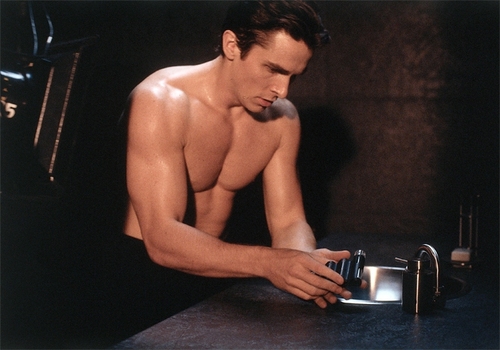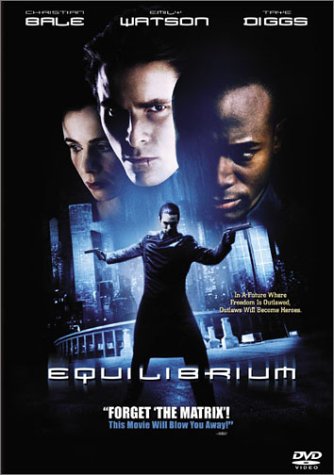Equilibrium is a universally compelling action drama that takes place in a post- WW3 universe where all wars and crimes have been eliminated, as well as all “evil” feelings of rage, violence, greed and such.
Oh, yes, there’s a catch. A gigantic one:
Along with the negative feelings and impuses that have been eradicated are also love, passion, friendliness and such. Nobody feels anything, complements of the government-supplied, obligatory doses of a drug.
What about stimulators, you might ask. Like music. Paintings. Personal taste. All forbidden. Nothing is custom, or individualistic. Nothing is colorful, or creative.
Everyone’s only an obedient, faded clone of themselves.
Oh, of course there’d be no point in watching the movie if it was all grey.
There are rebels, of course. People who refuse to take the drug are fighting against the totalitarian regime- with whatever means they can find.
Guess what the punishment is? Death by being burned. Or death on site during combat. They are seen as enemies of peace.
But the rebels have to fight, because what else is there? In a world where everything is soulless and grey, where there is no individuality, they prefer to go down fighting and feeling, as opposed to living without feeling. And who can blame them?
Now, until here, I painted the spoiler-free picture of the story. You can move on to my Equilibrium review for more on the movie . From now on, spoilers will flow –as we’ll analyze some of the most touching and relatable conflicts ever.
Now, don’t get me wrong. I have shared a lot of relatable and powerful story conflicts on this blog.
But with a lot of them, it is easy (and logical) to assume that you wouldn’t end up like that.
For instance, unless you are a tycoon, I don’t foresee you in the danger Tom Mullen was in Ransom.
We don’t live in the 18th century, so there goes A Royal Affair.
Assuming you didn’t marry a religious nut out of gratitude and then cheat on him with your next door neighbor, you don’t need to worry about being in the shoes of the characters in The Ledge.
You get my point.
But how about having ever lived in a country where the rules and regulations stifled you? The government wanting to be too involved in your private life –e.g. abortion rights? How about having been ruled by someone who wanted to empose his/her religious beliefs onto the public?
Now how much do you relate?
Granted, Equilibrium is an extreme scenario – but how extreme or fictional, apart from John Preston’s fighting skills – depends on where you live(d).
So with that in mind, let’ get back to the story, with spoilers:
John Preston (skillfully played by Christian Bale) is a priest- meaning he leads the armed forces against the rebels. He has an unique level of empathy, but he uses it to guess the hiding places and manevours of the rebels, not to understand them. He is extremely loyal, proud of his job and he is excellent at it.
One “disappointing” incident in his life has been his wife who, to his surprise, turned out to be “guilty of feeling” and was sentenced to death. As he raises his two children, this incident is the only “alarm” his life has raised and is the under “scrutiny” of the ruler.
The “second” incident makes him question everything more: His partner (Sean Bean) a great officer with a stellar record turns out to be “faking” the “not feeling.” This adds to the “scrutiny”.
However this brings up memories of his wife; and add some strange behavior from his son and some missing of the dosage; and things get very complicated as John starts to feel – overwhelmingly.

Everything bottled up and subdued comes out.
Now, he daily has to go through the conflict his partner went through:
Do you kill fellow “feelers” to keep up the role, protecting yourself and your family? Do you do your job?
or
Do you deny your impulses because it is too hard to bear?
Because in all honesty, there’s no way he can quit his job without giving himself away.
Of course after he can’t give up on feeling once he realizes what he is missing, John starts sucking at his job. And after a while, it is only fair that he joins the movement himself – especially he also has to lose another person he cares about.
So he fights.
It is a big, difficult fight but he wins in the end.
The glory feels wonderful. Things will no longer be the same, in all senses of the word.
Of course the movie is so much more. A lot of it has to do with the cast, especially Christian Bale who does a superior job of reflecting his characters’ both internal and external conflicts. You feel for him, understand him and want him to win with all your heart.
The war was fought for the right to feel, as well as the right to be whoever you want to be.
We often have to struggle in our lives when it comes to the right of being who we are. Sometimes it is against (or within) our family, friends, school, society, bosses, country….How much we win can depend on the level of authority we are fighting for.
Sometimes it is small, sometimes it is big. But we fight everyday. For some, the battle is tougher and on a much bigger scale. The key is never to give up.
So what do you think of the conflict(s) of this movie?
Can you empathize?
